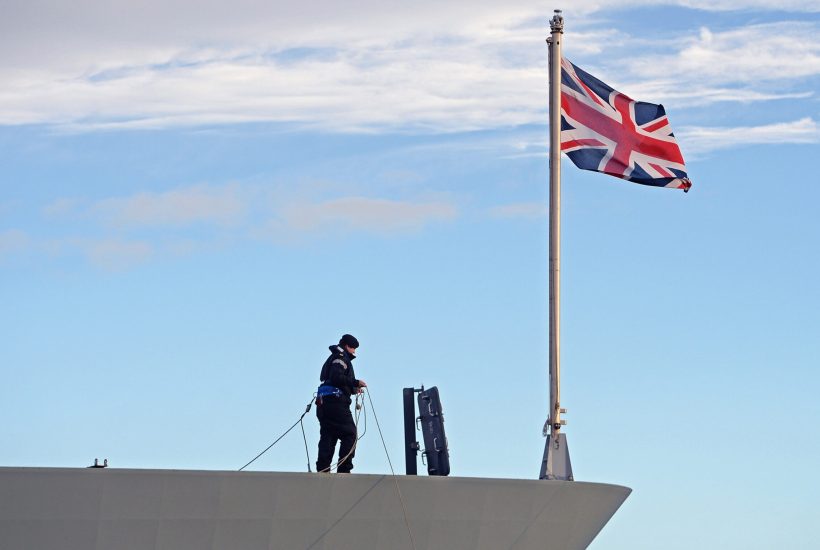Assuming that reports are accurate, the world has just witnessed the most serious escalation between the UK and Russia since the poisoning of Sergei Skripal three years ago. Russian bombs and gunfire were reportedly discharged near HMS Defender, currently patrolling the Black Sea. The Kremlin has justified the supposed aggression by stating that the ship had strayed into Russian waters. The UK, meanwhile, has denied that any such incident took place.
No warning shots have been fired at HMS Defender.
The Royal Navy ship is conducting innocent passage through Ukrainian territorial waters in accordance with international law.
— Ministry of Defence Press Office (@DefenceHQPress) June 23, 2021
Russia’s justification, if indeed it did what it claims it did, is based on a false premise. The coastline in question does not, in fact, belong to Russia — Defender was positioned off the Crimean peninsula. The international community recognises the territory as being an integral part of Ukraine. The waters in question, therefore, belong to Kiev and not Moscow.
The Navy has not yet commented on what Defender was doing in the Black Sea, only stating that it had broken away from the UK Carrier Strike Group’s Mediterranean deployment and moved to the Black Sea to pursue ‘its own set of missions’. It is possible that it was tasked with testing Russian readiness to defend its occupied coastline. The Kremlin does much the same when it periodically sends ageing strategic bombers into UK airspace to test RAF interception response times.
If true, the use of live ammunition would be a wilful escalation. Yet even if there were no shots fired at all, the Navy’s presence is likely part of a broader Nato strategy. Following Russia’s military posturing on Ukraine’s borders and Belarus’s interception of a RyanAir flight, the alliance wants to make clear that it will continue to challenge Moscow. Part of that means operating in the Black Sea. The area is of particular strategic importance and is home to two Nato allies (and Russian enemies) in the forms of Georgia and Ukraine.
It is worth noting the Putin administration’s proclivity for fake news and disseminating propaganda. Any dishonesty from the Kremlin would only be in keeping with its prior form — domestically this will serve as a show of the incumbent regime’s strength and counter any suggestion that support for Putin is wavering. Perfidious Albion has been a favourite target for the Kremlin, but any fake news over munitions dropped towards a British warship could serve to conceal a more embarrassing truth — that a single Royal Navy vessel came within a couple of yards of Russian-occupied coast unchallenged.
The next question is how the Navy’s Carrier Strike Group fares further south. Although it is principally operating against the remaining holdouts of the Syrian Islamic State, Russia maintains a sizeable military presence of its own in support of Bashar al-Assad. Moscow has already shown with Defender that its rules of engagement allow the use of warning shots — whether real or imagined.
The UK might be eager to show that it can assert itself on the world stage, a narrative that runs in tandem with its post-Brexit rebrand, but the Kremlin is clearly equally prepared to show that it is willing to open fire at western forces. Putin cannot afford a climb down in the face of mounting domestic opposition and the half-hearted western response to his past transgressions in Georgia, Ukraine, and the wider world.
For its part, the Navy will need to consider just how far Russia is willing to go during its operations off the coast of Syria. Britain will not want to be seen to be climbing down either. In 2004 and 2007, sailors and marines were apprehended by Iranian Revolutionary Guard forces for allegedly ‘trespassing’ into Iranian waters. In both cases they surrendered without resistance.
Naturally the government will want to avoid any major escalation with Moscow — the notion of mutually assured destruction is as terrifyingly true in 2021 as it ever was during the Cold War. But Russian aggression has, in the case of Skripal, proved a uniting force in the face of fractious British and European relations.
An exchange of fire — or even casualties — will not automatically lead to an outbreak of open war. What it should do, though, is prove that Cold War Two is not a hypothetical: it is already here.<//>
Got something to add? Join the discussion and comment below.
Get 10 issues for just $10
Subscribe to The Spectator Australia today for the next 10 magazine issues, plus full online access, for just $10.



















Comments
Don't miss out
Join the conversation with other Spectator Australia readers. Subscribe to leave a comment.
SUBSCRIBEAlready a subscriber? Log in